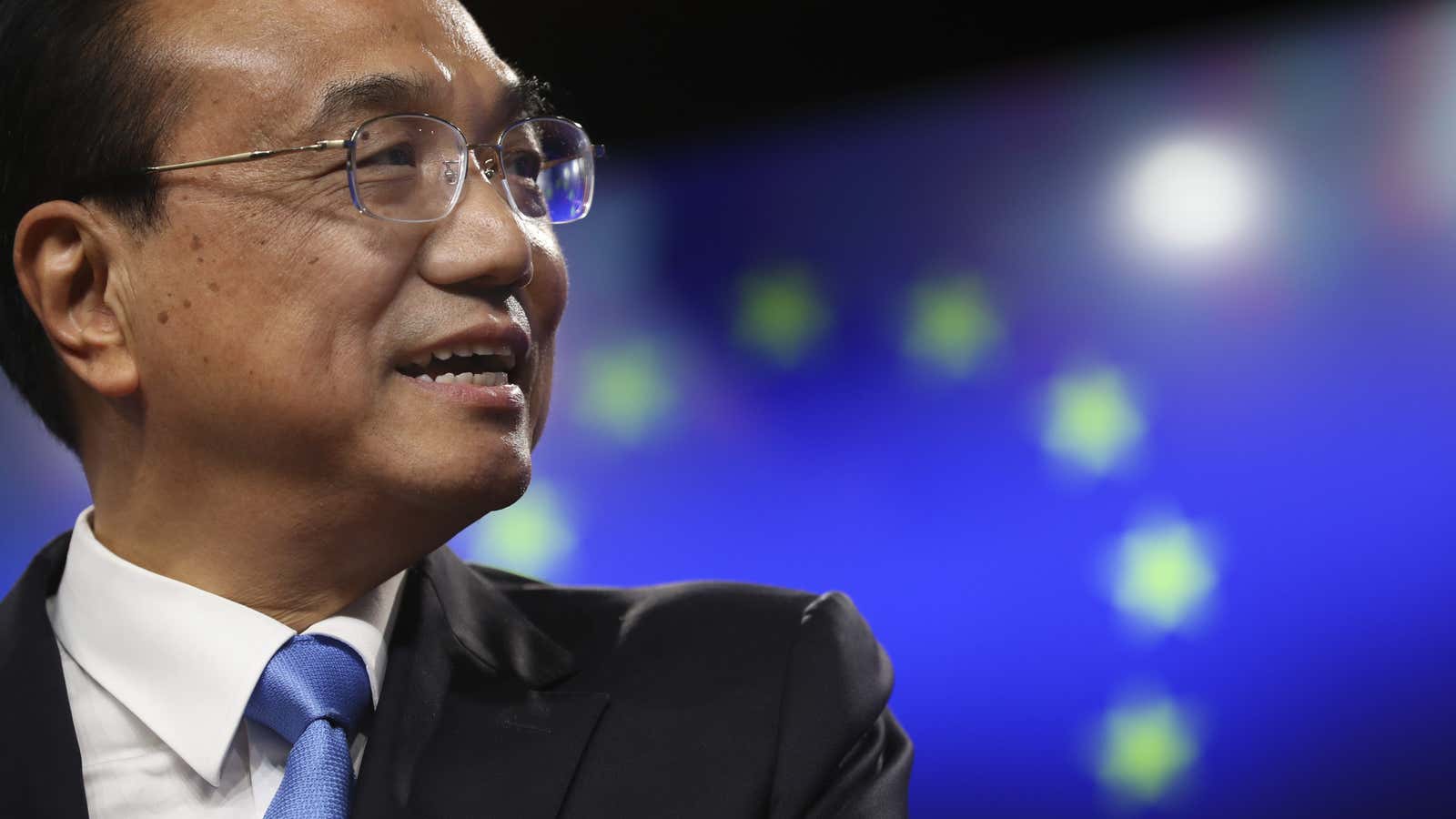This week’s European Parliament elections will have immediate political consequences for many member states, and will serve as a referendum (paywall) on the 60-year experiment in cross-continental democracy that is the European Union. Thousands of kilometers away, another stakeholder in the bloc, one with an increasing amount of clout, will also be closely watching.
China’s involvement in the EU has ramped up significantly in recent years. That’s in part due to the enormous amount of trade that passes between the two parties: China is the EU’s second-largest trading partner after the US. Europe is also a crucial region for China’s growth ambitions, including its two signature initiatives: the Made In China 2025 plan and Belt and Road Initiative (BRI). But Beijing’s increasingly assertive role on the continent has some European nations, and their allies, worried.
The significance of that involvement was on display in March, when Chinese president Xi Jinping visited France, Italy, and Monaco (paywall) in a much-publicized tour meant to promote commercial partnerships between Chinese and European firms. During his visit, Xi said that China needs “a united and prosperous Europe” and that France and China should build a relationship based on “mutual trust, practical cooperation, and friendly sentiments.”
The visit was the culmination of months of unprecedented movement in the EU-China relationship. After a recent EU-China Summit in Brussels, Beijing agreed to work with the bloc to reform the World Trade Organization, a move European Council president Donald Tusk described as a “breakthrough.” In March, Italy became the first G7 country to sign a memorandum of understanding with China to join the BRI, for the tidy sum of €2.5 billion ($2.8 billion). Thus far, none of the bloc’s other large industrialized countries have signed up. China has also strengthened ties with western Balkan nations on the EU accession list and meets with them, as well as 12 EU nations, every year in what they have named the 16+1 group to discuss investment opportunities.
“In the Chinese original conception of the BRI, Europe is the final destination of this ambitious project, and still represents the largest and most attractive consumer market for Chinese products,” Philippe Le Corre, a senior fellow at the Carnegie Endowment for International Peace, testified to the US House of Representatives Foreign Affairs Committee earlier this month.
But China has also faced some setbacks. In March, the European Commission released an unusually confrontational strategic policy proposal (pdf) that called China a “systemic rival.” In April, the EU put in place a screening mechanism for foreign investments (pdf) aiming to make the process of foreign countries investing in Europe more transparent. Analysts say the move was a direct response to China’s business practices (paywall) in Europe. And anti-China sentiment is rising in the leadership ranks of the EU: Senior officials have expressed concerns about China’s role in the Balkans (paywall) and about Chinese companies threatening European companies in industries like commercial aviation, telecom infrastructure, robotics, and solar panels.
That’s why, at this critical juncture in their relationship, China is paying close attention to the results of an election that may influence its ability to do business on the continent. The country is reportedly reaching out (paywall) to individual European MEPs to “win support for [its] agenda through alternatives to official diplomatic channels.” And China has invited MEPs across the political spectrum (paywall), from far-right populists to staunch Communists, to visit in an effort to secure support for its European push, and hedge against the unpredictable results of this election.
“They realize in China that the European Parliament is not as insignificant a body as a lot of people say,” says Le Corre. “They are monitoring the situation in the European elections, because depending who runs the parliament … it may affect their interests.”
Le Corre gives the example of the EU’s policy on fifth-generation cellular networks, or 5G. Chinese telecom giant Huawei is the world leader in 5G technology, but the US accuses the company of using its tech to spy on behalf of the Chinese government. Brussels is in the process of building an EU-wide national security risk assessment for 5G technology. In the meantime, Huawei has already signed deals to install 5G networks in several European countries. The continent is divided (paywall) over its 5G strategy broadly, something both China and the US have criticized, for very different reasons.
“If the EU was to put together a plan on 5G that would help European players in that field to emerge to counter Chinese players, that would be of interest to the Chinese,” says Le Corre. “The European Parliament does have a say on trade and investments and on what China is doing economically in Europe, and that is the main concern of the Chinese government.”
By electing certain political parties to parliament, EU voters also have an indirect say in who will become the next president of the European Commission, a body that has huge power over EU policy, law, and funding, as well as EU expansion, issues that concern China.
The bloc’s approach to China’s growing presence in Europe has been mixed. Italy’s governing coalition is split over the decision to join the BRI because of concerns over China “colonizing” the country, as deputy prime minister Matteo Salvini put it. Intelligence agencies and opposition parties have objected to UK prime minister Theresa May’s decision to allow Huawei to supply “non-core” telecom equipment. And Emmanuel Macron has been vocal in his criticism (paywall) of China—but recently invited Xi to France, where he signed billions of euros worth of commercial agreements with Beijing.
China certainly knows what it wants to do in Europe. It won’t sit idly by while Europe decides what to do with China.
